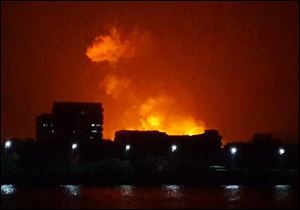
4 bodies found on Indian sub; 14 more likely dead
8/16/2013
The night sky is lit up as a fire burns aboard INS Sindhurakshak, an Indian Navy kilo class submarine in Mumbai, India Wednesday.
NEW DELHI — Indian navy divers today recovered four severely burned bodies of sailors who had been trapped inside a submarine damaged by twin explosions, officials said. The navy said it was doubtful that any of the other 14 sailors aboard survived.
Naval spokesman Narendra Vispute told reporters that the condition of the bodies suggested that all 18 sailors aboard were killed in the explosions in the sub’s home port of Mumbai. Three bodies were recovered early today and a fourth was located later in the afternoon, a naval official said on condition of anonymity because he wasn’t authorized to speak to reporters.
“The bodies are severely disfigured and not identifiable due to severe burns,” Vispute said, adding that DNA tests would be used to identify the bodies. “However, the navy will continue to search every inch of the submarine until no bodies remain to be found.
The 16-year-old diesel-powered, Russian-made submarine, INS Sindhurakshak, was rocked by two explosions in the torpedo compartment that sent huge fireballs into the air. The vessel was partially submerged at Mumbai’s naval dock, with a portion visible above the waterline.
Reaching sailors trapped in the crippled, water-filled vessel was made all the more difficult because the heat of the blast melted some hatch doors shut. The navy said there has been no contact from any of the sailors — not even a knock on the hull — since the accident occurred.
A press statement from the navy today said that while divers had been working around the clock to reach the compartments of the submarine since the explosions occurred, search efforts were hindered by the “oily and muddy waters inside the submerged submarine resulting in total darkness and nil visibility within the submarine even with high power underwater lamps.”
Twisted metal restricted space in the interior and resulted in search and rescue efforts being “very slow and labored,” allowing only one diver clear access at a time, the statement added.
The same submarine was hit by an explosion in 2010 that killed one sailor and injured two others. The navy said that accident was caused by a faulty battery valve that leaked hydrogen, causing an explosion in the vessel’s battery compartment. There have been no details on what caused this week’s blasts.
The sub recently returned from Russia after a 2½-year refit, overhaul and upgrade and had been certified for use by the Indian navy.
Russian ship repair company Zvyozdochka said the blasts were unrelated to its repair work.